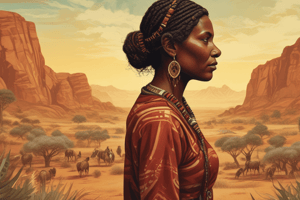Podcast
Questions and Answers
What was the first recorded European landfall on the Australian continent?
What was the first recorded European landfall on the Australian continent?
- Willem Janszoon in 1606
- James Cook in 1770 (correct)
- The Dutch in 1788
- The British in 1901
What is the oldest human remains found in Australia?
What is the oldest human remains found in Australia?
- Madjedbebe rock shelter
- Lake Mungo remains (correct)
- Aboriginal Australians
- European settlers
What is the capital of Australia?
What is the capital of Australia?
- Sydney
- Melbourne
- Brisbane
- Canberra (correct)
How many states are there in Australia?
How many states are there in Australia?
What document was adopted in 1942 that confirms the validity of legislation passed by the Australian Parliament during World War II?
What document was adopted in 1942 that confirms the validity of legislation passed by the Australian Parliament during World War II?
Flashcards are hidden until you start studying
Study Notes
-
Australia is a country comprising the mainland of the Australian continent, the island of Tasmania, and numerous smaller islands.
-
The ancestors of Aboriginal Australians began arriving from south east Asia approximately 65,000 years ago.
-
European settlement of Australia began with the Dutch navigator Willem Janszoon in 1606.
-
The British explorer James Cook mapped and claimed the east coast of Australia for Great Britain in 1770.
-
The European population grew in subsequent decades, and by the end of the 1850s gold rush, most of the continent had been explored by European settlers.
-
Democratic parliaments were gradually established through the 19th century, culminating with a vote for the federation of the six colonies and foundation of the Commonwealth of Australia on 1 January 1901.
-
Australia has since maintained a stable liberal democratic political system and wealthy market economy.
-
Politically, Australia is a federal parliamentary constitutional monarchy, comprising six states and ten territories.
-
Australia's population of nearly 26 million is highly urbanised and heavily concentrated on the eastern seaboard.
-
Canberra is the nation's capital, while its most populous city and financial centre is Sydney.
-
The next four largest cities are Melbourne, Brisbane, Perth, and Adelaide.
-
Australia's demography has been shaped by centuries of immigration: immigrants account for 30% of the country's population, and almost half of Australians have at least one parent born overseas.
-
Australia's abundant natural resources and well-developed international trade relations are crucial to the country's economy, which generates its income from various sources including services, mining exports, banking, manufacturing, agriculture and international education.
-
Australia ranks amongst the highest in the world for quality of life, democracy, health, education, economic freedom, civil liberties, safety, and political rights, with all its major cities faring exceptionally in global comparative livability surveys.
-
It is a member of international groupings including the United Nations, the G20, the OECD, the WTO, ANZUS, AUKUS, Five Eyes, the Quad, APEC, the Pacific Islands Forum, the Pacific Community and the Commonwealth of Nations.
-
Aboriginal Australians are the indigenous people of Australia.
-
They comprise two groups - the Aboriginal peoples of the Australian mainland (and surrounding islands including Tasmania), and the Torres Strait Islanders, who are a distinct Melanesian people.
-
Human habitation of the Australian continent is estimated to have begun 50,000 to 65,000 years ago, with the migration of people by land bridges and short sea crossings from what is now Southeast Asia.
-
It is uncertain how many waves of immigration may have contributed to these ancestors of modern Aboriginal Australians.
-
The Madjedbebe rock shelter in Arnhem Land is recognised as the oldest site showing the presence of humans in Australia.
-
The oldest human remains found are the Lake Mungo remains, which have been dated to around 41,000 years ago.
-
Aboriginal Australian culture is one of the oldest continuous cultures on Earth.
-
The first recorded European sighting of the Australian mainland, and the first recorded European landfall on the Australian continent, are attributed to the Dutch.
-
The first ship and crew to chart the Australian coast and meet with Aboriginal people was the Duyfken captained by Willem Janszoon.
-
In 1788, the British raised the Union Flag at Sydney Cove, Port Jackson, Australia's first colony, which became a self-governing democracy.
-
The British claimed the whole of the Australian continent, and by the mid-19th century, each of the six colonies had gained responsible government.
-
The British controlled foreign affairs and defence, while the colonies managed most of their own affairs.
-
In 1901, federation of the colonies was achieved after a decade of planning, constitutional conventions and referendums, resulting in the establishment of the Commonwealth of Australia as a nation.
-
The Australian Constitution, which was adopted in 1942, confirms the validity of legislation passed by the Australian Parliament during World War II.
-
After World War II, Australia enjoyed significant increases in living standards, leisure time and suburban development.
-
In the decades following World War II, Australia encouraged a large wave of immigration from across Europe.
-
Australia was a member of the Western Bloc during the Cold War.
-
Australia participated in the Korean War and the Vietnam War.
Studying That Suits You
Use AI to generate personalized quizzes and flashcards to suit your learning preferences.




